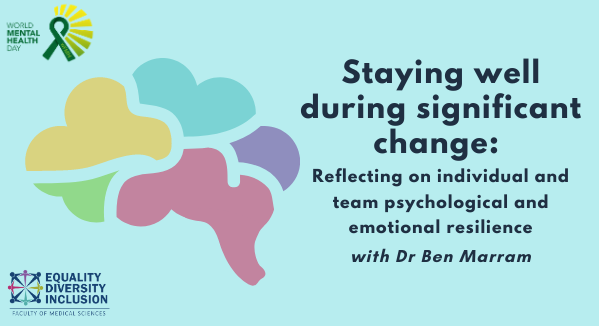
In honour of World Mental Health Day 2020, last month, Dr Ben Marram, Highly Specialised Clinical Psychologist at the Newcastle Mitochondrial Service, gave a wonderful talk on maintaining resilience during significant periods of change. This is a brief wrap up of the talk if you missed it; since it contained some very prevalent and poignant advice for the current global situation. At the end is a link to the video recording of the talk so you can experience it yourself – which we highly recommend!
Staying Well During Significant Change – Recap
The talk took place largely because in 2020, World Mental Health day coincided with the eighth month of lockdown regulations across the country. Times like these where the world seems upside down are challenging for the mental health of individuals and teams alike. Dr Ben Marram was kind enough to give us his insight into psychological fortitude during unprecedented, and often scary, change. Here are the five takeaways from his talk:
1. What is resilience?
Dr Marram discussed resilience and whether it can be truly defined. The most important take on resilience, however, was that during difficult times, your mental health does not suffer simply because you are not resilient enough. Resilience is ever-changing and highly malleable, and it is normal for its capacity to feel run down during a global pandemic! So don’t put yourself down for feeling low or off balance – resilience falters naturally from time to time.
2. Impact of COVID: Uncertainty Distress
This pandemic causes huge amounts of uncertainty distress: the negative emotions experienced in response to as-yet unknown aspects of a given situation. COVID-19 breeds this; bringing not just a threat to our health, but ever-changing rules and lack of clarity. In response to this, Ben suggests you try and reduce the number of lifestyle changes happening at one time, if you can, so you aren’t undergoing any massive shifts. Take it one step at a time, and do your best to find time to do things that bring you calm.
3. Psychological Safety in Teams
Dr Marram gave examples of how to encourage psychological safety in our professional and personal lives. For example, admitting to colleagues if you’re feeling nervous, afraid, or struggling to adapt because of COVID: your team can become a stronger & safer psychological space for all as a result. Communication is key to getting through periods of psychological and societal turbulence!
4. Tips for Psychological Flexibility
Finally, the importance of psychological flexibility was discussed: a matter of contacting the present moment; as well as keeping in touch with things and values important to you during periods of stress. He recommends any form of mindfulness (scripted or practical), grounding yourself through your five senses, and really doing your best to reinforce psychological safety.
So there you have it: a run-down of advice on emotional resilience during uncertain and stressful times. We do really recommend you watch the whole thing – Dr Marram’s insight is poignant, and extremely helpful to all of us as we head into a global lockdown. Check it out in the video below. And once again, thank you to Ben for taking the time to talk to & encourage us through this period of uncertainty!
To watch or download the video recording of the event, click here!
